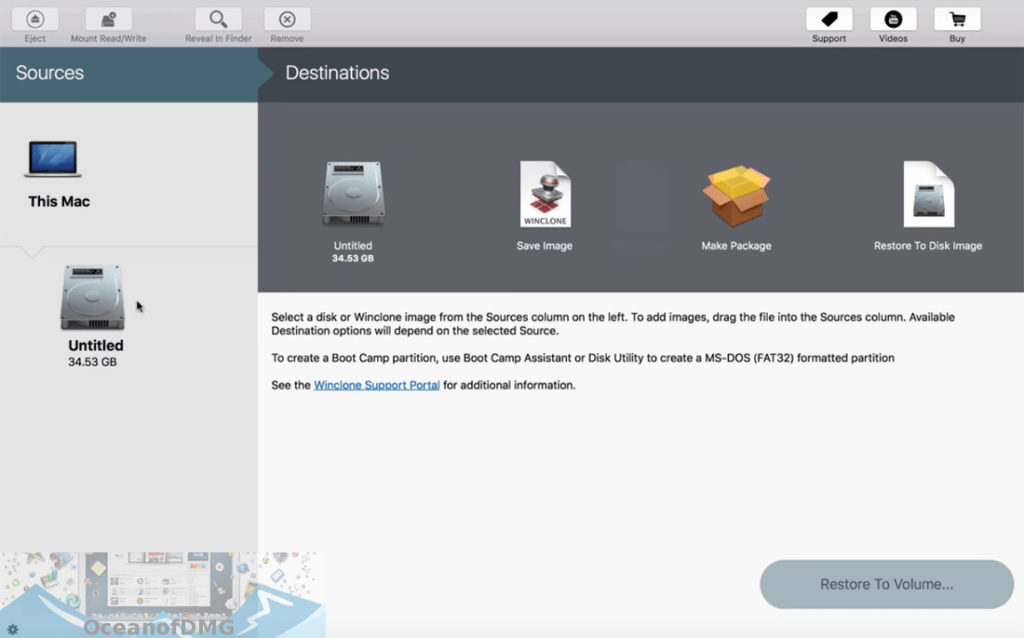

- #Mac winclone pro install
- #Mac winclone pro drivers
- #Mac winclone pro driver
- #Mac winclone pro windows 10
- #Mac winclone pro pro
#Mac winclone pro drivers

Copy all the items in the ISO to the USB Flash Drive in the Finder by selecting all the items and then dragging to the USB Flash Drive.
#Mac winclone pro windows 10
#Mac winclone pro driver
In order to boot Windows, this driver must be injected from Windows on an external drive. This is due to the lack of a generic driver in Windows 10 for the mass storage on the T2 Macs. Once the Winclone image has been restored, booting to the Boot Camp partition will result in a “Inaccessible Boot Device” blue screen error. Verify that you want to restore: Injecting Drivers Select the Winclone image created on the Source Mac and the new Boot Camp partition you created. Using Winclone 8, restore the Winclone image by clicking the “Restore Image” button: Note that the size of the partition can be any size that is large enough to hold the data used in the migrating Boot Camp partition.Ĭonfirm the addition on the new partition by verifying that a new partition will be added and the Mac volume will be resized: When the Winclone image is restored, the format will automatically be changed to NTFS. Select the size of the new Boot Camp partition, give it a name, and select the format as ExFAT. If you are prompted to add volume to a container or adding a partition, select “Partition”: Select the Macintosh volume and click the Partition button. Open Disk Utility in the Utilities folder: NOTE: MAKE SURE YOU HAVE A GOOD BACKUP OF THE DATA IN MACOS PRIOR TO CREATING A NEW PARTITION IN CASE OF ERROR. On the destination Mac, create a Boot Camp partition using Disk Utility and restore the Winclone image.

Give the image a name and click “Save to the HFS+ formatted external drive”: Restore Image to Destination Mac Select the Boot Camp partition and click “Save Image”: Open Winclone 8 and select “Create Image from Volume”: File-based imaging is the default imaging format in Winclone 8. The Winclone image must be a File-based format (specified in Winclone Preferences). On the source Mac, create a Winclone image using Winclone 8 and save to the External drive formatted as HFS+.
#Mac winclone pro install
The new Mac is then booted from the USB flash drive and a script is run to install the drivers on the restored Boot Camp partition. Prior to booting into Windows 10, a USB flash drive is created with the Apple drivers (downloaded from Boot Camp assistant) and a Windows 10 installation ISO.
#Mac winclone pro pro
To migrate Windows 10 from an older Mac to a Mac Pro (2019), a Winclone image is saved on the older Mac, copied to an HFS+ formated external drive, and restored to a new partition on the new Mac. This article covers all the steps to migrate from an older (non-T2) Mac. Supports restoring images created with Winclone 3.x, 4.x and 5.Migrating Windows 10 from an older Mac to a Mac Pro (2019) with Winclone 8 requires an additional step of injecting the Apple SSD driver to allow initial boot of Windows 10. Winclone Packages can deploy fully setup and configured Windows images, base images that configure on first run, or a WinPE environment to image and configure using standard Microsoft tools. If you can install a package, you can deploy a Boot Camp partition. Winclone packages can be deployed using any client management system that can deploy macOS packages. Winclone Pro can create a package installer creates the Boot Camp partition and restores a Winclone image to the new partition. Winclone is the most reliable cloning solution when migrating Boot Camp to a new Mac. Winclone is the most complete solution for protecting your Boot Camp Windows system against data loss.


 0 kommentar(er)
0 kommentar(er)
